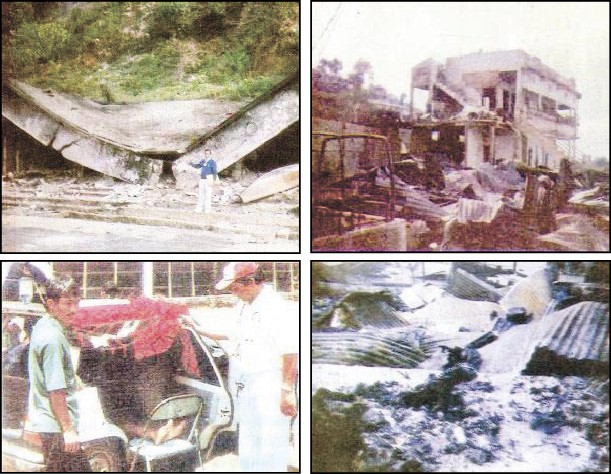The aftermath of the December 27, 1994 violence in Mokokchung.

Limalenden Longkumer
Mokokchung | December 27
Twenty-seven years ago, on December 27, 1994, Mokokchung town experienced the most appalling act of military highhandedness abetted by the Armed Forces Special Powers Act (AFSPA), 1958 when personnel of the 16 Maratha Light Infantry of the Indian Army committed atrocities against unarmed and innocent civilians. Arson, brutality and rape committed never went reported in the media but have been well documented by civil society and scores of eyewitnesses are still alive to testify the macabre incident.
The recent incident at Tiru-Oting area in Mon has refreshed the memory of the ordeal of December 27, 1994 Mokokchung incident.
“Are we waiting for a worse incident or is this not enough?” was the question asked by MB Longkumer, a prominent senior citizen of Mokokchung town who was also appointed by Ao Senden as a “One Man Committee” to meet the National Human Rights Commission after the December 27, 1994 Mokokchung incident.
Recollecting the incident as “petrifying and hair-raising,” MB Longkumer reiterated his earlier recorded statement that the crime committed by the Indian army on December 27, 1994 cannot be forgotten nor forgiven. On repealing AFSPA, MB Longkumer says that it should be repealed but the Naga people must also retrospect on “who we are, what we are fighting for, and change our moves with the changing times” while also adding that it is not the time for violence and armed movement.
Limaonen Imchen, who as a 9-year-old boy experienced the ordeal on that fateful day 27 years ago, admits that fear was embedded in his psyche and that he lost his trust in the Indian army after the incident. He recounts how his father’s shop was razed down by the army that affected his family’s economic prospects and his academic career, and how his neighbour’s father was burned to death in the arson. He admits he developed fear and hate towards the army personnel after the incident. “I have forgiven them but not forgotten,” he adds.
Today, as a father of two, he says that he sees hopelessness on the faces of the people as “anything can happen” as long as AFSPA remained.
Almost every adult Naga growing up before the ceasefire, who are now in their fifties, have experienced harassment at the hands of the army, according to Temsu Jamir who himself was detained and blindfolded for 12 hours by the military personnel. Saying that AFSPA was alienating the Naga people from the Indian Union, he opined that this was the right time to repeal the controversial act.
“Appeasement won’t work. Justice must be delivered,” he asserted and said that “statements bearing false testimony against the innocent dead are more hurtful.” “Is this how they treat us?” he questioned.
On December 27, 1994 when the people were in the midst of the festive and wedding season, the Indian army scripted the darkest chapter in the history of Mokokchung town since its establishment in 1890. This must be reminded to the youngsters, says a resident of the town who did not wish to be named. Bullets fired by the army are still lodged on the walls of his parental home. His whole family was herded by the army personnel to the open town square where they were made to lie face down for hours along with countless others.
According to records documented by civil society organisations, the violence on December 27, 1994 left 89 shops, 48 houses, 17 vehicles and 7 two wheelers razed down, excluding those destroyed by gunfire and shelling. 7 civilians were gunned down, another 5 burned alive including a child and 8 women raped.






